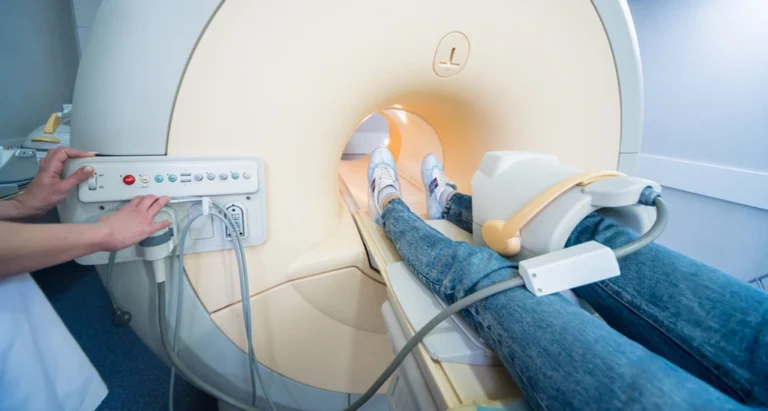When diagnosing and treating short-term or long-term knee injuries, your doctor may recommend a knee MRI (magnetic resonance imaging). A knee MRI provides detailed images of the knee joint, bones, ligaments, and other surrounding structures.
What Is A Knee MRI?
A knee MRI is a non-invasive imaging technique that uses magnetic fields and radio waves to capture high-resolution images of the knee. These images allow your doctor to visualize the internal structures of your knee, helping them make an accurate diagnosis and determine the best treatment plan for you.
Knee MRIs use a combination of magnetic fields and radio waves to identify conditions affecting the knee. All types of MRIs use no forms of ionizing radiation making them a safe option for viewing soft tissues of the body.
Why Would My Doctor Order A Knee MRI?
A knee MRI is more commonly ordered by an orthopedist who specializes in musculoskeletal conditions including knee pain and discomfort. A knee MRI can help diagnose and monitor treatment response for the following conditions:
- Ligament injuries (such as ACL tears)
- Meniscal tears
- Tendonitis
- Cartilage damage
- Bone fractures
- Arthritis
- Tumors
- Infections
How Does A Knee MRI Differ From Other Imaging Techniques?
While X-rays and CT scans provide valuable information about the bones, Knee MRIs excel at visualizing soft tissues such as ligaments, tendons, and cartilage. Knee MRIs provide multiplanar images which allow your doctor to view your knee from various angles and orientations providing a comprehensive assessment. Unlike X-rays and CT scans, MRIs do not use any forms of ionizing radiation.
What Are The Benefits Of A Knee MRI?
A knee MRI provides numerous benefits. Here are a few ways an MRI can improve the health of your knee:
- Accurate diagnosis and treatment planning: By providing intricate, comprehensive images of your knee, MRIs allow your doctor to make an accurate diagnosis ensuring the most effective treatment plan is developed.
- Strong visualization of the soft tissues: The knee is made up of a series of parts including cartilage, ligaments, muscles, and bones. A knee MRI allows your doctor to assess the integrity of these structures, and identify tears or damage. The full picture of your condition cannot always be captured through an X-ray or a CT scan.
- Improved surgical outcomes: For patients who require knee surgery, a pre-operative knee MRI can provide important information to your orthopedic surgeon. Your MRI results will help plan the procedure in advance, locate the exact area of concern, and optimize the approach to the surgery, improving your surgical outcomes.
- Early detection of conditions: Knee MRIs can detect medical conditions at an early stage, even before symptoms are present. This early detection allows for early intervention, preventing further damage and improving recovery times.
How Do I Prepare For A Knee MRI?
On average, a knee MRI lasts about 45 minutes. On the day of your appointment, avoid wearing any clothing or accessories that contain metal including jewelry, belts, or buttons. If you have any metal artifacts or implants, please inform your doctor prior to your appointment. Not all metal implants are compatible with MRIs, so it is important to check with your doctor or speak with our staff about the correct accommodation. For a knee MRI, your entire body will not be in the machine allowing for ample headroom during the study.
What If I Am Nervous or Claustrophobic?
If you are feeling nervous or claustrophobic, there are many alternatives available. Many of our offices are equipped with wide-bore MRIs. Wide-bore MRIs offer a wider opening and use AI-assisted software to decrease scan times. Mild sedation options are available in some cases. Speak with your referring doctor to learn more about what alternatives and accommodations are available for you.
Are Knee MRIs Painful?
A knee MRI is a painless and non-invasive medical imaging technique. Some patients may experience minor discomfort from lying still for an extended period while the images are being captured. This is completely normal. Our highly trained MRI technologists will be available to assist you if there is any immediate discomfort or anxiety.
Are Knee MRIs Safe?
Generally, knee MRIs are completely safe. If you have metal implants such as pacemakers or spinal cord stimulators, inform your doctor before your appointment to check the compatibility of your device with an MRI. MRIs generate strong magnetic fields which can impair the metal artifact from working as intended. Our MRI technologist will review your medical history including the presence of any metal artifacts prior to your study.
Can I Drive After A Knee MRI?
In most cases, you can resume your normal, daily routine including driving, immediately following a knee MRI. The study itself does not cause any impairment that would prevent you from safely operating a vehicle. However, if you receive any form of sedation prior to or during the study, it is important to arrange for a ride home.
Where Can I Schedule A Knee MRI?
South Jersey Radiology is in-network with 99% of health insurance plans for MRI imaging and provides scans including knee MRIs at up to 60% less than the cost of hospital-based imaging. SJRA offers same-day and next-day appointment options with many locations offering evening and weekend hours to fit your busy schedule.
Reach out to any of the following locations to schedule your appointment:
- Marlton (Greentree) Office – Marlton, NJ
- Medford Office – Medford, NJ
- Moorestown Office – Moorestown, NJ
- Mount Laurel Office – Mount Laurel, NJ
- Route 73 (Voorhees) Office – Voorhees Township, NJ
- Sewell (Washington Township) Office – Sewell, NJ
- Turnersville Office – Turnersville, NJ
- Voorhees (Carnie Boulevard) Office – Voorhees Township, NJ
- West Deptford Office – West Deptford, NJ
- Willingboro Office – Willingboro, NJ
Learn more about the board-certified, subspecialized radiologists who read and interpret studies at SJRA here.
Frequently Asked Questions
A knee MRI is a non-invasive imaging technique that uses magnetic fields and radio waves to capture high-resolution images of the knee. It provides detailed images of the knee joint, bones, ligaments, and other surrounding structures.
A knee MRI is commonly ordered by an orthopedist who specializes in musculoskeletal conditions. It can help diagnose and monitor treatment response for ligament injuries, meniscal tears, tendonitis, cartilage damage, bone fractures, arthritis, tumors, and infections.
Knee MRIs excel at visualizing soft tissues such as ligaments, tendons, and cartilage. Unlike X-rays and CT scans, knee MRIs do not use any forms of ionizing radiation and provide multiplanar images, allowing for a comprehensive assessment of the knee from various angles and orientations.
• Accurate diagnosis and treatment planning
• Strong visualization of soft tissues
• Improved surgical outcomes
• Early detection of conditions
On the day of your appointment, avoid wearing any clothing or accessories that contain metal. If you have any metal artifacts or implants, inform your doctor prior to the appointment. Your entire body will not be in the machine during a knee MRI, allowing for ample headroom.
If you are nervous or claustrophobic, there are alternatives available, such as wide-bore MRIs with wider openings and AI-assisted software to decrease scan times. Mild sedation options may also be available in some cases. Consult with your referring doctor for more information.
A knee MRI is a painless and non-invasive medical imaging technique. Some patients may experience minor discomfort from lying still for an extended period, but this is normal. MRI technologists will be available to assist if there is any immediate discomfort or anxiety.
Generally, knee MRIs are safe. However, if you have metal implants such as pacemakers or spinal cord stimulators, inform your doctor before the appointment to check compatibility. Strong magnetic fields generated by MRIs can impair the function of metal artifacts. Your medical history and the presence of any metal artifacts will be reviewed before the study.
In most cases, you can resume your normal daily routine, including driving, immediately following a knee MRI. However, if you receive any form of sedation prior to or during the study, arrange for a ride home.
You can schedule a Knee MRI at South Jersey Radiology, which is in-network with 99% of health insurance plans for MRI imaging. They offer same-day and next-day appointments, with many locations offering evening and weekend hours. Contact any of the following locations to schedule your appointment:
• Route 73 Office – Voorhees Township, NJ
• Greentree Office – Marlton, NJ
• Washington Township Office – Sewell, NJ
• Turnersville Office – Turnersville, NJ
• Voorhees Office – Voorhees Township, NJ
• West Deptford Office – West Deptford, NJ


